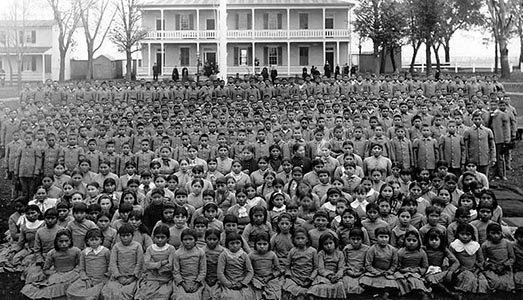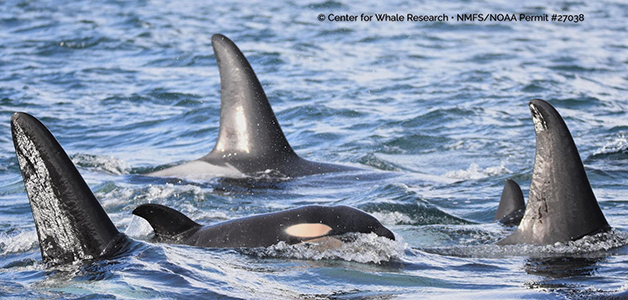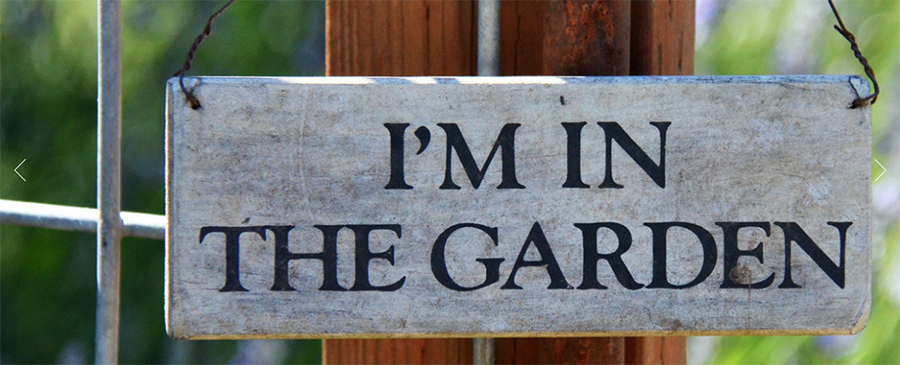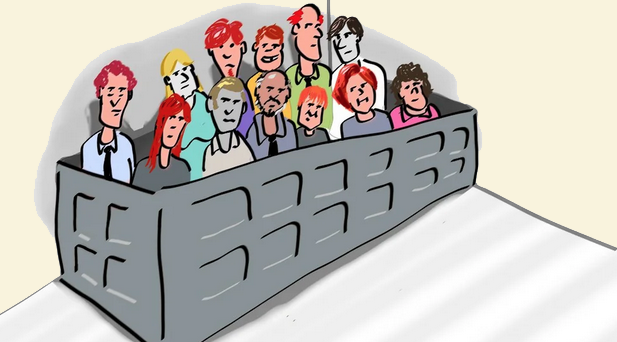||| FROM JUDY MEYER and IRIS GRAVILLE, for LOPEZ ISLAND FRIENDS (QUAKER) |||
As awareness of the long-term harm caused by Indian Boarding Schools grows, Orange Shirt Day (September 30) is more important than ever. The date is a national holiday in Canada and a Day of Remembrance in the US.
It recognizes the intergenerational trauma caused by government policies that removed Native American children from their families. Many were transported hundreds of miles to residential schools, where they were beaten if they spoke their native language or practiced their cultural traditions. Children there were routinely physically and mentally abused, not given enough to eat, and exposed to diseases. The children also provided much of the labor to clean and maintain the schools as well as working in the gardens and caring for the farm animals. They were often hired out to local farmers to labor on their farms. Hundreds never returned home and are buried far from their ancestors.
Why is it called Orange Shirt Day? Phyllis Webstad, of the Stswecem’c Xgat’tem First Nation in British Columbia, was taken to a residential school in 1973 at the age of 6 and was forced to remove the special orange shirt that her grandmother had made for her. It was the beginning of experiences that destroyed her self-esteem. “All I remember most is crying, being lonely,
and how no one really cared about me or any of us kids.” Now each fall, she and many others wear orange shirts bearing slogans like “Every Child Matters” to recognize the harm done to Native children and their families by residential schools.
Whole villages were affected by the schools’ harmful policies. One of the Alaskan Natives whose children were forced to go to a boarding school described the village after the children left: “the village was so quiet because there was no children. No children in the village.” Imagine the profound feelings of sorrow and loss if all the children, even those as young as 6, were forced to leave our island and sent to a school far away. Native American families are still struggling to heal from that trauma.
Indigenous-led organizations like National Native American Boarding School Healing Coalition have beenformed to help in this healing process, including unearthing boarding school records so families can find their relatives who were sent off to boarding schools but never returned. At the government level and under the leadership of Deb Haaland, the US Department of Interior began theFederal Indian Boarding School Initiative with goals including identifying sites of former boarding schools, names and tribal affiliations of those sentto the schools, and locations of burial sites of children who died at the schools.
To address the goal of learning the impacts of boarding schools, the Initiative has sponsored “The Road to Healing.” Themes from survivor and descendant experiences shared in these listening sessions include intergenerational trauma, familial secrecy, embarrassment, shame,chemical dependency, and disassociation. Stories from these sessions and results from searches of government records form the basis of the recently released “Federal Indian Boarding School Initiative Investigative Report,”
Volume 2.
The report reveals that between 1819 and 1969 there were 417 federally-sponsored schools at 451 sites in 37 states, including 17 sites in Washington. The investigation identified the names of 18,624 children who attended these schools, 973 who died there, and 74 burial grounds containing marked and unmarked graves; the report acknowledges that these numbers are underestimates. The federal government provided support to 59 religious organizations to run about half of the schools. In
addition to federally-funded schools, the report lists 1025 additional institutions that likely educated Indian children.
Importantly, the report makes several recommendations, the first of which is “Acknowledge, Apologize, Repudiate, and Affirm.” Consider wearing an orange shirt on September 30 to acknowledge the harm done by these schools and show your support for survivor healing. You can turn your support into action by writing our Congressional Representatives, asking
them to support the Truth and Healing Commission bill (S. 1723/H.R.7227).
As members of Lopez Island Friends (Quaker) Meeting, we acknowledge that 30 of these schools were run by Quakers. We support a national Quaker organization, Toward Right Relationship with Native Peoples, in its work to help heal the harm done. The organization is presenting a webinar on November 10 to share what a number of denominations are doing.
Representatives of Catholic, Episcopal, Lutheran, Presbyterian, Methodist, and Quaker faith communities will share how they are conducting research and approaching questions of accountability, apology, reparations, and healing. You can register for the webinar at to learn what your religious community is doing to help heal the wrongs done to Native Peoples.
**If you are reading theOrcasonian for free, thank your fellow islanders. If you would like to support theOrcasonian CLICK HERE to set your modestly-priced, voluntary subscription. Otherwise, no worries; we’re happy to share with you.**








